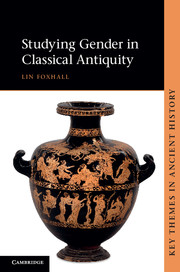Book contents
Chapter 8 - Conclusions
Published online by Cambridge University Press: 05 May 2013
Summary
This book has probed many aspects of ancient Greek and Roman life and culture that were shaped by gender. Many others have been omitted for lack of space, and there is much more to say about the themes I have discussed than it was possible to say here. This is hardly surprising, since gender is such a large, persistent and pervasive subject which affects all of us as individuals, families and communities as much as it affected people in the ancient world, albeit in ways that are often very different. Situated as it is at the intersection of the biological, socio-cultural and political realms, it is inescapable for all of us, and most of us have internalized and naturalized many elements of it, at least to some extent. And yet, it is clear that although gender may present itself most clearly as a dichotomy of male and female, the lived reality was far more complex, not least because of its intersections with other socio-cultural and political factors (age, class, status, wealth, etc.).
The overarching theme that emerges from this study is that gender is one of the most important attributes that Greeks and Romans used to create hierarchies, partitions and boundaries in specific ways. These structured both individual activities and group dynamics to a very considerable extent, in the realms of politics, social relations and economics, as well as moulding individual identities and personalities (for example, through specifically gendered notions of self-control). It also seems probable that in many periods and places in the classical world people would have spent much more of their time, and their lives, than we would be accustomed to with others of the same sex. But this is not to say that such boundaries were uniform, unquestioned or impermeable. Barriers establish the potential for transgression. Although our sources regularly display unease with behaviours that do not fit the accepted paradigms of gender polarity, it is clear that many kinds of gendered behaviours were a poor fit to the ideal and that a spectrum of behaviours and formulations of gender were accommodated, if not always comfortably.
- Type
- Chapter
- Information
- Studying Gender in Classical Antiquity , pp. 158 - 159Publisher: Cambridge University PressPrint publication year: 2013



